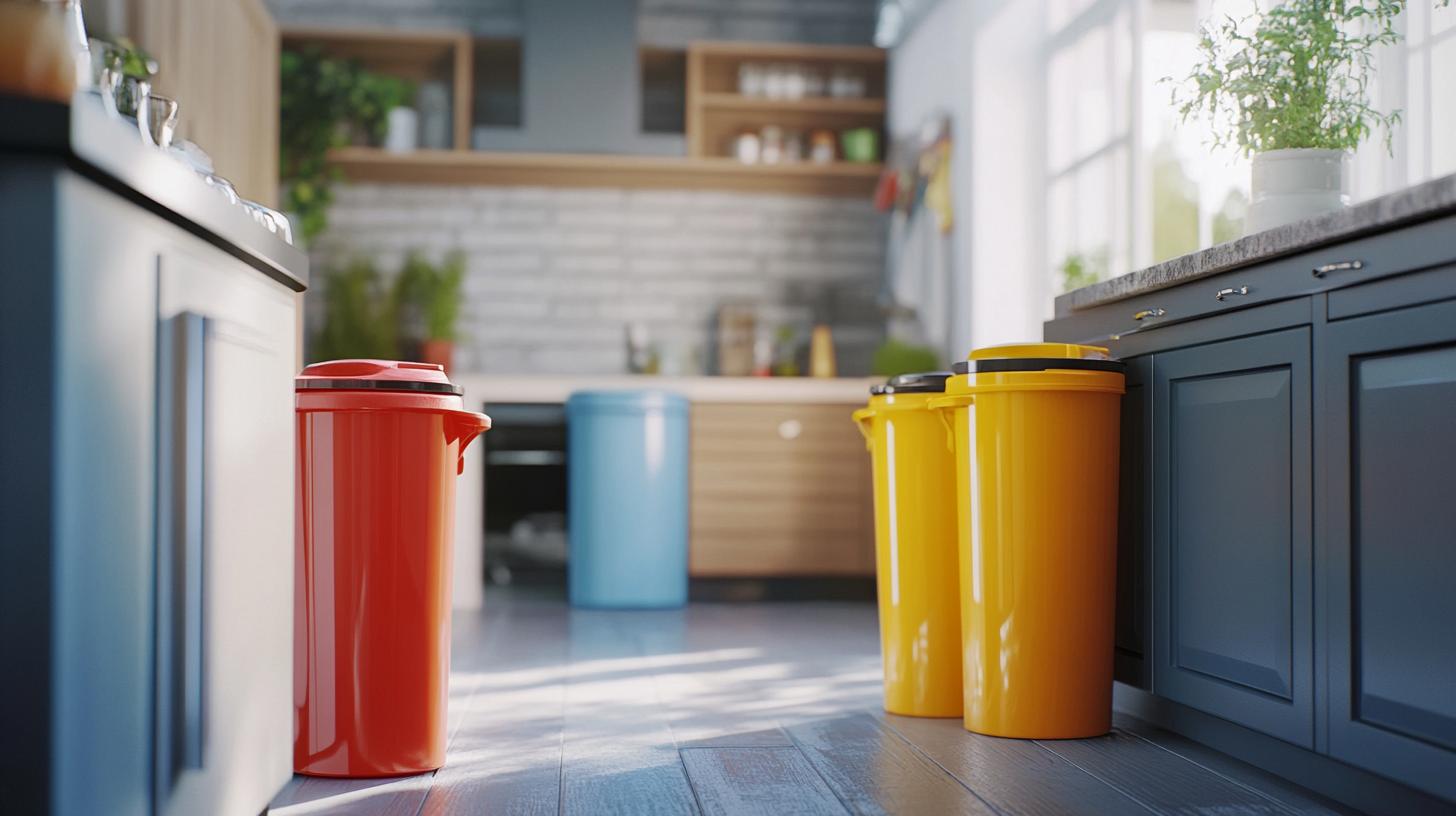Eco Friendly Waste Solutions for Your Home without Using Trash Compactors
With the rising concern over environmental sustainability, homeowners are increasingly seeking eco-friendly waste solutions to reduce their carbon footprint. According to the Environmental Protection Agency (EPA), around 292.4 million tons of trash were generated in the United States alone in 2018, with more than 60% of that waste being recyclable or compostable. However, many households still rely on traditional waste disposal methods, such as the At Home Trash Compactor, which may not be the most sustainable option. Instead, innovative alternatives are emerging that not only minimize waste but also promote a healthier living environment.
Transitioning away from reliance on trash compactors opens up a world of sustainable practices that can be easily integrated into daily life. For instance, composting organic waste can divert approximately 25% of household waste away from landfills, as highlighted by the National Organic Recycling Association. In addition, adopting practices such as waste auditing, upcycling, and utilizing reusable containers can significantly lower waste output while fostering a culture of sustainability. By embracing these eco-friendly waste solutions, homeowners can contribute to a cleaner planet and inspire their communities to follow suit.

Innovative Recycling Methods: Transforming Household Waste into Valuable Resources
Innovative recycling methods offer a fantastic opportunity to transform household waste into valuable resources, significantly reducing our environmental footprint. One effective approach is composting organic waste, such as kitchen scraps, yard clippings, and paper products. By creating a compost pile or bin, homeowners can convert these materials into nutrient-rich soil, perfect for gardens or houseplants. This not only diverts waste from landfills but also enriches the earth, promoting healthier ecosystems. Another effective method is upcycling, which involves creatively repurposing items that would otherwise be discarded. From turning glass jars into stylish storage containers to converting old furniture into unique decor pieces, upcycling encourages creativity and sustainability. It reduces the demand for new products and minimizes waste, allowing individuals to express their style while contributing to a circular economy. By embracing these innovative recycling methods at home, we can turn what was once considered trash into treasures, fostering a more sustainable lifestyle. Additionally, engaging in local recycling programs can further enhance the value of household waste. Many municipalities offer specific collection days for electronics, textiles, and other seldom-disposed-of items, with the goal of maintaining a clean and sustainable community. Participating in these initiatives helps ensure that valuable materials are not lost forever in landfills, and it encourages responsible disposal practices that benefit everyone. By adopting innovative recycling solutions, we can all play a part in transforming our waste into resources that protect our planet for future generations.

The Impact of Composting: Reducing Landfill Waste by 30% in Your Garden
Composting is rapidly gaining recognition as one of the most effective eco-friendly practices for waste management in residential settings. According to the United States Environmental Protection Agency (EPA), approximately 30% of the waste produced in the average household is organic material that can be composted. By diverting these materials from landfills, we not only reduce the volume of waste but also transform our gardens into vibrant ecosystems.
Research indicates that composting can cut down landfill waste by about 30% when implemented effectively. A study conducted by the Composting Council found that composting just a small fraction of typical kitchen scraps, such as fruit peels and vegetable trimmings, can lead to substantial reductions in greenhouse gas emissions and improve soil health. The compost produced enriches soil, encouraging microbial activity and enhancing plant growth, thus creating a sustainable loop that benefits both our gardens and the environment.
Moreover, the process of composting is straightforward and can be adapted to fit various living situations, from large backyards to urban apartment balconies. With a variety of composting methods available, such as vermicomposting and bokashi, homeowners can choose an approach that suits their lifestyle. By actively participating in composting, individuals contribute to a larger movement aimed at reducing waste and fostering a greener future, showcasing how simple actions can lead to significant environmental impacts.

Eco-Friendly Storage Solutions: Sustainable Alternatives to Traditional Trash Cans
As we become increasingly aware of our environmental impact, finding eco-friendly storage solutions has never been more critical. Traditional trash cans often contribute to landfill waste, and many household items end up discarded instead of recycled or repurposed. According to the EPA, in 2020, about 292.4 million tons of trash were generated in the U.S., with only 35% being recycled or composted. Thus, innovative solutions beyond conventional trash disposal methods are essential for sustainable living.
One effective alternative is using compost bins for organic waste, which not only diverts food scraps from landfills but also enriches garden soil. Utilizing containers made from recycled materials, such as bamboo or recycled plastic, enhances eco-friendliness while maintaining aesthetics. Additionally, repurposed jars can serve as storage for recyclables, which not only organizes but also prompts mindful consumption.
Promoting sustainable practices at home aligns with the recent recognition of the 2024-25 Sustainability Innovation Seed Grant Award Winners, who have demonstrated groundbreaking ideas in promoting sustainability. Their projects often focus on community engagement and innovative waste solutions, showing that effective change begins at home. By adopting eco-friendly storage alternatives and supporting industry innovations, we contribute to a larger movement toward sustainable living and waste reduction, effectively transforming our homes into models of ecological responsibility.

Zero-Waste Lifestyle: Proven Strategies to Minimize Household Waste by 50%
Adopting a zero-waste lifestyle is an effective way to minimize household waste by 50% or more while promoting environmental sustainability. One of the first steps toward achieving this is to assess your current consumption habits. Begin by identifying items in your home that are frequently discarded, such as plastic packaging, single-use products, and food waste. Keeping a waste diary for a week can provide insight into what you throw away and help you develop strategies to eliminate unnecessary items.
Once you have a clearer picture of your waste generation, consider implementing simple yet powerful changes. Start by opting for reusable products—invest in cloth bags, stainless steel water bottles, and glass containers for storage. Choosing bulk or package-free options when shopping can also significantly cut down on waste. Establishing a composting system for organic waste further enhances your zero-waste efforts. Composting not only reduces the waste sent to landfills but also provides rich nutrients for your garden.
Another key strategy is to donate or repurpose items instead of discarding them. Create a designated area in your home for items that can be sold, donated, or upcycled. This not only keeps clutter at bay but also extends the life cycle of goods that might otherwise end up in the trash. Embracing a mindset of creativity and resourcefulness can lead to innovative solutions and deeper satisfaction in your sustainable journey. By implementing these proven strategies, achieving a significant reduction in household waste becomes an attainable goal.
The Role of Local Recycling Programs: Maximizing Your Contributions to Community Sustainability
Recycling programs play a crucial role in promoting sustainability within our communities. By participating in local initiatives, residents not only reduce landfill waste but also contribute to a circular economy. These programs are designed to make it easier for citizens to recycle materials like paper, plastics, and metals, thereby minimizing the need for new resource extraction and reducing environmental impact.
Moreover, local recycling programs often provide education and resources to help families understand the importance of waste reduction. They can offer workshops, informational pamphlets, and online resources that guide residents on how to properly sort and dispose of recyclables. By engaging with these programs, individuals can maximize their contributions and ensure that their efforts are beneficial, ultimately fostering a more sustainable community.
In many areas, community-driven recycling initiatives also encourage local collaboration. They can organize events such as clean-up days or recycling drives, bringing neighbors together to work towards a common goal. This spirit of cooperation not only enhances community bonds but also amplifies the collective impact of individual actions on environmental sustainability. Embracing local recycling programs enables everyone to be a part of the solution while fostering a culture of responsibility and environmental stewardship within the neighborhood.

